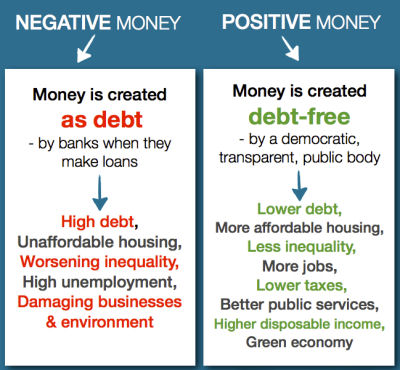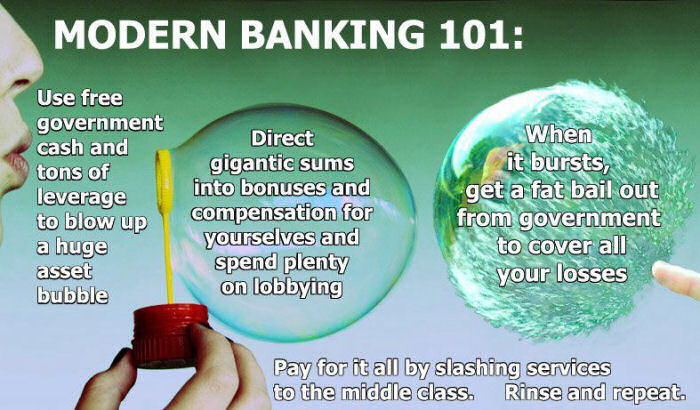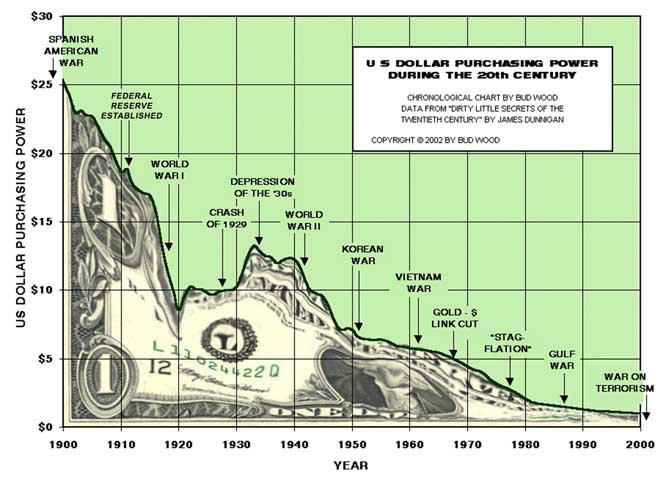
|

1300
Venetian moneylenders began to sell debt issues to other lenders and to
individual investors.
1500 Belgium exchange
dealt exclusively in promissory notes and bonds.

"Slavery is likely to be
abolished by the war power and chattel slavery destroyed.
This I and my European
friends are glad of,
for slavery is but the owning of
labor and carries with it the care of the laborer, while
the European plan led by England is for
capital to control labor by controlling wages.
This can be done by controlling the money.
Debt is a means to control the volume of money.
To accomplish
this BONDS must be used.
We are now waiting
for the Secretary of the
Treasury to make his recommendation to Congress.
It will not do to
allow the Greenback, as it is called, to circulate as money
any length of time, as we cannot control that." - Hazzard Circular, 1862, Bank
of England

1864
International bankers take
control.
National
Banking Act specifies the entire US money supply will be printed out of
debt by the national banks through the purchase of US treasury bonds by issuing
them as assets backing treasury banknotes.
US treasury bonds, or
T-bills, are guaranteed by the US government.
As long as the US
government is solvent US treasury bonds
retain value.
A US treasury bond, or treasury note, is
a promissary note.
A promissary note is
a promise to pay a specified amount on a specified date.
They typically
include an interest payment for
the use of capital while held.
A bond is a debt security, paper
collateral for the loan.
A bearer bond is a bond or debt security issued
by an incorporated entity.
Bonds issued by corporations are
corporate bonds or junk
bonds.
"In years following the war,
the federal government ran
a heavy surplus.
It could not however pay off its debt, retire its
securities, because to do so meant there would be no bonds to back the
national bank notes.
To pay off national debt was to
destroy the money supply." - John Kenneth
Galbraith

1861 Moses Taylor, Chairman of the Loan Committee to
finance the Union in the Civil War, offers the government $5,000,000 of US
treasury bonds at 12% at a 33% shaving to continue financing the Civil War.
It is suggested Abraham Lincoln go to Congress to requestingthe passage
a bill authorizing the printing of full legal tender treasury
notes.
"To pay the soldiers the Government issued Treasury notes,
authorized by act of Congress, July 17, 1861, for $50,000,000, bearing no
interest.
These notes circulated at par with gold.
Rothschild
agents inspired the American banks to offer to Lincoln a loan of up to $150
million.
But before they had taken much of the loan, the banks broke
down and suspended specie payments in December 1861.
They wished to
blackmail Lincoln and demanded the 'shaving' of government paper to the extent
of 33%, an extortion
which was refused.
A bill drafted for government issue of $150 million,
which should be full legal tender for every debt in the US, passed the House of
Representatives Feb. 25, 1862, and was hailed with delight by the entire
country.
The Wall Street bankers were
furious." - Arthur Cherep-Spiridovich
1893 "The interests of national banks require immediate
financial legislation by Congress (the US Government).
Silver, silver
certificates, and Treasury bonds (all government money) must be retired, and
National Bank Notes made the only money.
This will require the
authorization of $500 million to $1 billion of new bonds as the basis of
circulation.
At once retire one-third of your currency and call in
one-half of your loans.
Be careful to make a monetary stringency among
your patrons, especially among influential businessmen.
Advocate an
extra session of Congress to repeal the purchasing clause of the Sherman
Law, and act with other banks of your city in securing a large petition to
Congress for its unconditional repeal per accompanying form.
Use
personal influence with your Congressmen, and particularly let your wishes be
known to your Senators.
The future life of national banks depends upon
immediate action, as there is an increasing sentiment in favor of government
legal-tender notes and silver coinage."- "The Panic Circular", American
Bankers' Association 1893

"Traditional money systems depend on faith
and
general ignorance to stay afloat." - Jason Rohrer
"The truth is that no bank lends as much as
a penny of the money deposited with it.
Every bank loan or overdraft is a creation of entirely new money
(credit) and is a clear addition to the amount of money in the community.
It is no more than a record in a bank ledger
or computer and is actually the creation of new money out of nothing." -
Jane Birdwood
"The bank-debt currency system we have today is founded
upon interest.
That's the motivation for banks to create
money in the first place.
Creating money is only a side effect,
irrelevant to the commercial bank, of their main purpose of earning a profit.
Another effect is the necessity of perpetual economic growth and
conversion of all
common wealth into
private monetary wealth." -
Charles Eisenstein
"It started with
goldsmiths.
Early
bankers initially provided safekeeping services by making a profit from vault
storage fees for gold and coins deposited.
People would redeem their
"deposit receipts" whenever they needed gold or coins to purchase something,
and physically take the gold or coins to the seller who, in turn, would
deposit them for
safekeeping, often with the same banker.
Everyone soon found that it
was a lot easier simply to use the deposit receipts directly as a means of
payment.
These receipts, promissary notes, were acceptable as
money since whoever held them could go to the banker and exchange them for gold
and coins.
Then, bankers discovered that they could make loans merely by
giving their promise to pay, or bank notes, to borrowers.
In this way,
banks began to create money.
More notes could be issued than the gold
and coin on hand because only a portion of the notes outstanding would be
presented for payment at any one time.
A fractional reserve of gold and
coin had to be kept on hand to redeem whatever volume of notes was presented
for payment.
Transaction deposits are the modern counterpart of bank
notes.
It was a small step from printing notes to making book entries
crediting deposits of borrowers, which the borrowers in turn could "spend" by
writing checks." - Chicago Federal Reserve, Modern Money
Mechanics

In a
fractional reserve banking
system, such as the fiat paper
money/fungible asset
system used internationally, the debt
has to continue to climb until, at some point, it must be
forgiven.
Debtors can never aquire
enough capital to fully pay off their debt.
In a closed fractional
reserve system money is only printed through loans like the ones granted by the
BIS today.
When $10 is deposited $100 is loaned out.
Assume an annual
interest rate of 10%.
The borrower is required to pay $110 back to
the bank, but $10 is still held as reserves by the bank and only $100 has been
put out into circulation.
Where does the extra $10 to be paid as
interest come from?
"Imagine the first bank which prints and lends out
$100.
For its efforts it asks for the borrower to return $110 in one
year; that is it asks for 10% interest.
The bank has created
a mathematically impossible
situation.
The only way in which the borrower can return 110 of the
bank's notes is if the bank prints and lends more.
The result of
creating 100 and demanding 110 in return, is that the collective borrowers of a
nation are forever chasing a phantom which can never be caught; the
mythical $10 that was never
printed.
The debt is in fact, unrepayable.
Each time $100 is
printed, the nation's overall indebtedness to the system is increased by $110.
The only solution at present is increased borrowing to cover the
principal plus the interest of what has been borrowed." - Roger Langrick
Economists,
financial marketers,
refer to "the business
cycle," "boom and bust,"
"recession," "depression",
"tech bubble" and "housing bubble" in order to
confuse and
distract - as "asset bubbles" are real.
Banking families
intermarry and building international
dynasties.
Frederick Soddy defines banks: "Institutions which pretend to lend money,
do not lend it, but create it, and when it is repaid, de-create it and have
achieved the physically impossible
miracle thereby, not only of getting something for nothing but also of
getting perennial interest from it."
The money changers soon discovered
that their control of this fraudulent
paper promissary note money supply, as
there was more paper in circulation than in
deposits, gave them
control over the economy and the assets of many of those who had borrowed
money.
The money changers exacted their control of the economy and
their wealth accumulation by manipulating the
money supply - easy money and
tight money - economic
contraction and expansion.

securitizing loans
"What we have found over
the years in the marketplace is that derivatives have been an extraordinarily
useful vehicle to transfer risk from those who shouldn't be taking it to
those who are willing to and are capable of doing so." - Alan Greenspan
2003
"Clearly, derivatives are a
centerpiece of the crisis, and Alan Greenspan was the leading proponent of
the deregulation of derivatives."
- Frank Partnoy 10/08/08
"The derivatives market is $531 trillion, up from
$106 trillion in 2002 and a relative pittance just two decades ago. Alan
Greenspan banked on the good will of Wall Street to
self-regulate." - Peter S.
Goodman 10/08/09
Investment banks are able to "balance" and prove
adequate reserves by "securitizing" loans which allows investment banks to
move those loans off the balance
sheets.
There are two ways to securitize a
loan:
sell the securitized loan as a 'corporate' bond (originally
made popular by Michael Robert Milken* as
junk bonds);
or "synthetic"
securitization: use of derivatives to get rid of the risk of default (with
credit default swaps) and
lock in the interest rate due on the loan (with
interest-rate default
swaps).
Once an investment bank securitizes a loan that it is
off the balance
sheet.
Once a loan has been moved
off the balance sheet the capitalization ratio improves and the
investment banks can make even more
loans.
Investment banks print
trillions of dollars of credit without maintaining adequate capital reserves
(leveraged up to 33 to 1 - 3.3 times
higher than the traditional fractional reserve of 10 to 1) by providing
sub-prime mortgages, student loans and credit card
loans to millions of loan applicants who have no documentation, no income,
no collateral and a bad credit history for enormous short term
profits!
Investment
banks did this without tying up any of their capital reserves while
con-vincing the
purchasers of the
securitized
commercial paper that there was no risk of default!

"Bankers are in the debt business, and if
governments are allowed to create enough money to
keep themselves and
their constituents out of debt, lenders will be out of business.
The central banks charged
with maintaining the banking business therefore insist on a stable currency at
all costs, even if it means slashing services, laying off workers, and soaring
debt and interest burdens.
For the financial business to continue to
boom, governments must not be allowed to create money themselves, either by
printing it outright or by borrowing
it into existence from their own government-owned banks." - Ellen
Brown
Federal Reserve issues stock which is held by
over 2,900 banks.
The Federal Reserve pays a 6 percent dividend which
amounted to $1.637 billion in 2012, the last year of available data.
Fed Open Market Committee creates money out of
nothing!
Most "currency" is now in the form of electronic
spreadsheets, rather than paper records such as ledgers.
Open market operations are conducted
simply by electronically increasing or decreasing ('crediting' or 'debiting')
the amount of currency that a bank has in its reserve account at the central
bank in exchange for a fungible instrument -
an entry in an electronic
spreadsheet !
Currency
magically appears when the balance in a reserve account is increased.
The newly printed currency is
then used by the central bank to purchase on the open market fungible instruments which may or
may not be backed with tangible financial assets, such as US bonds, foreign
currency, or gold.
When the
central bank sells fungible instruments on
the open market, the amount of currency
the purchasing bank holds decreases, effectively destroying
currency.
The US Treasury sells marketable securities - T-Bills,
promissary notes, bonds, and Treasury Inflation-Protected Securities
(TIPS) to the public through regular public auctions to raise the cash needed
to operate the US government and to refund maturing
securities.

Marketable securities are fungible financial
instruments.
Marketable
securities are simply government IOU's.
Marketable securities can be bought, sold or
transferred after they issue.
Marketable
securities are purchased in order to get a secure rate of interest.
At the end of the term of the
marketable security,
the US Treasury repays the principle, plus interest and the
marketable security is
destroyed - ie. the fungible instrument is deleted from the electronic
speadsheet.
For example one of the twelve Fed banks -
Boston, New York,
Philadelphia, Cleveland,
Richmond, Atlanta, Chicago,
St. Louis, Minneapolis, Kansas City, Dallas,
San Francisco - that make up the Federal Reserve system exchanges a fungible
instrument for $1,000,000 of marketable securities with the US Treasury.
When the fractional
reserve is 10% - $10,000,000 can then be loaned on a $1,000,000 purchase of
marketable Treasury securities.
Regional Federal Reserve Banks then issues
loans to regional member banks.
To reduce the amount of money in
circulation this process is simply reversed.
When the Federal Reserve
sells marketable securities to the public the money flows out of regional
banks.
When the fractional reserve is 10% - regional loans must be then
reduced by ten times the amount of the US Treasury marketable securities.
A purchase of $1,000,000 in marketable securities results in a
$10,000,000 reduction of currency in the regional economy when fractional
reserve rules are observed.

"The financial system has been turned
over to the Federal Reserve Board. That board administers the finance system by
authority of a purely profiteering
group." - Charles A Lindbergh Sr.Federal Reserve
controls the amount of currency in circulation in two ways.
The first
way the Federal Reserve controls the amount of currency in circulation is
through the purchase and sale of marketable
securities.
The second way the Federal Reserve controls the amount
of currency in circulation is through the interest rate it charges its member
banks.
But the Federal Reserve also controls the interest rate on the
marketable securities through the purchase and sale of
marketable securities.
When the
US Treasury offers more marketable securities
than the rate of demand of those
marketable securities then
the Federal Reserve can step in and purchase the excess capacity to
keep interest rates low or the Federal Reserve
can refuse to purchase those marketable
securities and the interest rate on those
marketable securities will
increase to draw in needed capital.
When interest rates go up less
currency is loaned out and less currency in
the system creates contraction - recession or depression.
Monetary
policy, set by the privately owned and operated Federal Reserve, is highly
independent of effective political control.
Federal Reserve is
subservient only to Bank of
International Settlements.

municipal debt bonds
Christopher "Kit" Taylor, the former chief regulator and
executive director of the
Municipal Securities Rulemaking Board from 1978 to 2007, said the
members of the board wouldn't allow the group to
set rules on credit default swaps and derivatives for the $2.69 trillion
municipal bond market.
"The big firms didn't want us touching derivatives.
They said,
'Don't talk about it, Kit.'
I saw bankers looking out for their self
interest in my years at the MSRB.
The
attitude changed from,
'What can we do for the good of
the market,' to, 'What can we I do to ensure the future of my
business.'
The profit wasn't in the
underwriting, it was in
the swap.
Right up until the day we went to real-time disclosure, I was
getting calls from bankers wanting to delay it.
The only ones who
benefited from delaying transparency were those who profited from the trades."-
Christopher "Kit" Taylor
1975 Congress set up the Municipal
Securities Rulemaking Board to make rules for firms that
underwrite, trade and
sell municipal debt.
The board, funded by member firms, generates
$22.2 million in fiscal 2008..
As a
self-regulatory organization, members of the industry are granted the authority
to supervise their own practices.
A 15-member board oversees the
organization and 10 of the directors are from
Wall Street firms.
Enforcement is handled by the Securities and Exchange Commission.
August 1983 Washington Public Power Supply
System bonds to build five nuclear reactors default.
January 2010 Las Vegas Monorail bonds default.
November 9, 2011 Jefferson County Commission voted 4 to 1 to
declare bankruptcy on roughly $4 billion in
municipal debt.
2011 28 defaults totaling $522
million.
June 28, 2012 Stockton files for Chapter
9 protection.
2012 21 defaults on muni debt
totaling $978 million, according to Richard Lehmann, publisher of Distressed
Debt Securities Newsletter.
July 18, 2013 Detroit
files for bankruptcy on a municipal debt
of $20 billion.
Aug 04, 2015 Puerto Rico defaults
on a $58 million bond.
July 1, 2016 Puerto Rico
defaults on $ 2 billion bond. |
|

 |
This web site is not a commercial web site and
is presented for educational purposes only.

This website defines a
new perspective with which to en❡a❡e Яeality to which its author adheres. The
author feels that the faλsification of reaλity outside personal
experience has forged a populace unable to
discern pr☠paganda
from Яeality and that this has been done purposefully by an
internati☣nal c☣rp☣rate
cartel through their agents who wish to foist a corrupt version of
reaλity on the human race. Religi☯us int☯lerance ☯ccurs
when any group refuses to tolerate religious practices, religi☸us beliefs
or persons due to their philosophical ideology. This web site marks the
founding of a system of philºsºphy nªmed The Truth of the Way of
the Lumière Infinie - a ra☨ional gnos☨ic mys☨ery
religion based on reaso🐍 which requires no leap of faith, accepts no
tithes, has no supreme leader, no church buildings and in which each and every
individual is encouraged to develop a pers∞nal relati∞n with the
Æon through the pursuit of the knowλedge of reaλity in the hope
of curing the spiritual c✡rrupti✡n that has enveloped the human
spirit. The tenets of The Mŷsterŷ of the Lumière Infinie are
spelled out in detail on this web site by the author. Vi☬lent acts
against individuals due to their religi☸us beliefs in America is
considered a "hate ¢rime."
This web site in no way
c☬nd☬nes vi☬lence. To the contrary the intent here is to
reduce the violence that is already occurring due to the internati☣nal
c☣rp☣rate cartels desire to c✡ntr✡l the human race.
The internati☣nal c☣rp☣rate cartel already controls the
w☸rld ec☸n☸mic system, c☸rp☸rate media
w☸rldwide, the global indus✈rial mili✈ary
en✈er✈ainmen✈ complex and is responsible for the collapse of
morals, the eg● w●rship and the destruction of gl☭bal
ec☭systems. Civilization is based on coöperation. Coöperation
with bi☣hazards at the point
of a gun.
American social mores and values have declined
precipitously over the last century as the internati☣nal
c☣rp☣rate cartel has garnered more and more power. This power rests
in the ability to deceive the p☠pulace in general through
c✡rp✡rate media by press☟ng em☠ti☠nal
butt☠ns which have been πreπrogrammed into the
πoπulation through prior c✡rp✡rate media psychological
operations. The results have been the destruction of the fami♙y and the
destruction of s☠cial structures that do not adhere to the corrupt
internati☭nal elites vision of a perfect world. Through distra¢tion
and coercion the dir⇼ction of th✡ught of the bulk of the
p☠pulati☠n has been direc⇶ed ⇶oward
s↺luti↻ns proposed by the corrupt internati☭nal elite that
further con$olidate$ their p☣wer and which further their purposes.
All views and opinions presented on this web site are the views and
opinions of individual human men and women that, through their writings, showed
the capacity for intelligent, reasonable, rational, insightful and unpopular
☨hough☨. All factual information presented on this web site is
believed to be true and accurate and is presented as originally presented in
print media which may or may not have originally presented the facts
truthfully. Øpinion and
☨hough☨s have been adapted, edited, corrected, redacted, combined,
added to, re-edited and re-corrected as nearly all opinion and
☨hough☨ has been throughout time but has been done so in the spirit
of the original writer with the intent of making his or her
☨hough☨s and opinions clearer and relevant to the reader in the
present time.
Fair Use Notice

This site may contain
copyrighted material the use of which has not always been specifically
authorized by the copyright owner. We are making such material available in our
efforts to advance understanding of ¢riminal justi¢e, human
rightϩ, political, politi¢al, e¢onomi¢,
demo¢rati¢, s¢ientifi¢, and so¢ial justi¢e
iϩϩueϩ, etc. We believe this constitutes a 'fair use' of any
such copyrighted material as provided for in section 107 of the US Copyright
Law. In accordance with Title 17 U.S.C. Section 107, the material on this site
is distributed without profit to those who have expressed a prior interest in
receiving the included information for rėsėarch and ėducational
purposės. For more information see:
www.law.cornell.edu/uscode/17/107.shtml. If you wish to use copyrighted
material from this site for purposes of your own that go beyond 'fair use', you
must obtain permission from the copyright owner. |
 Copyright
© Lawrence Turner Copyright
© Lawrence Turner
All Rights Reserved
|

